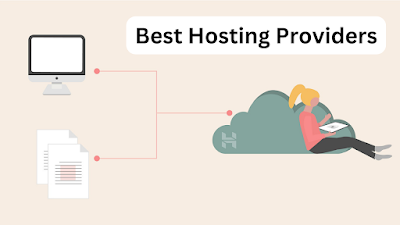There are many hosting providers available in the market, each with its own set of features and benefits. Here are some of the best hosting providers based on factors such as performance, reliability, pricing, and customer support:
Top Best Hosting Providers
(1) Bluehost - A popular choice for beginners, Bluehost offers reliable hosting services at affordable prices with a user-friendly interface.
Website Link - bluehost.com
(2) SiteGround - Known for its fast loading times and excellent customer support, SiteGround is a great option for businesses of all sizes.
Website - siteground.com
(3) HostGator - Offering a wide range of hosting plans and services, HostGator is a versatile hosting provider that can meet the needs of both beginners and advanced users.
Website - hostgator.com
(4) A2 Hosting - A2 Hosting offers blazing fast hosting services with a strong emphasis on performance and security.
Website - a2hosting.com
(5) InMotion Hosting - With a strong focus on customer support and reliable uptime, InMotion Hosting is a great choice for businesses looking for a high-quality hosting provider.
Website - inmotionhosting.com
(6) DreamHost - Known for its commitment to open-source software and strong emphasis on privacy, DreamHost offers reliable hosting services at affordable prices.
Website - dreamhost.com
(7) WP Engine - A specialized hosting provider for WordPress websites, WP Engine offers fast loading times and excellent customer support.
Website - wpengine.com
(8) Liquid Web - Offering a wide range of hosting plans and services, Liquid Web is a versatile hosting provider that can meet the needs of businesses of all sizes.
Website - liquidweb.com
GreenGeeks - Focused on eco-friendly hosting, GreenGeeks offers fast and reliable hosting services with a strong emphasis on sustainability.
Website - greengeeks.com
Hostinger - Known for its low prices and beginner-friendly interface, Hostinger is a great option for those just starting out with website hosting.
Website - hostinger.com
When choosing a hosting provider, be sure to consider factors such as uptime, server speed, customer support, pricing, and features to determine which provider is the best fit for your needs.
What is hosting :
Hosting is a service provided by companies that enables individuals and businesses to make their website accessible on the internet. When you create a website, you need a place to store all the files, images, videos, and other content that make up your website. A hosting provider offers you space on their servers to store your website files, and provides the necessary technology to make your website accessible on the internet.
When you sign up for hosting, you are essentially renting space on a server to store your website files. This server is connected to the internet and allows users to access your website by typing in your domain name or web address in their web browser. Hosting providers offer different types of hosting services, such as shared hosting, dedicated hosting, VPS hosting, and cloud hosting, each with their own benefits and pricing structures.
In short, hosting is an essential service that allows individuals and businesses to make their website accessible on the internet, and is a necessary step in creating a website.
Types of hosting :
There are several types of hosting available, each with its own features and benefits. Here are some of the most common types of hosting:
Shared hosting - In shared hosting, multiple websites share resources on the same server. This is a cost-effective option for beginners or small websites with low traffic.
VPS hosting - Virtual Private Server (VPS) hosting is similar to shared hosting, but each website is allocated a certain amount of resources and has its own virtual server. This provides more flexibility and control than shared hosting.
Dedicated hosting - With dedicated hosting, you rent an entire physical server dedicated solely to your website. This provides the highest level of control, security, and performance, but is also the most expensive option.
Cloud hosting - Cloud hosting uses a network of servers to distribute resources and provide scalability and reliability. This can be a good option for websites with fluctuating traffic.
Managed hosting - Managed hosting is a service in which the hosting provider takes care of the technical aspects of managing the server, including security, updates, and backups.
Reseller hosting - Reseller hosting allows you to sell hosting services to your own customers using the resources provided by a hosting provider. This can be a good option for web designers or developers who want to offer hosting services to their clients.
WordPress hosting - WordPress hosting is a specialized hosting service designed specifically for WordPress websites. It is optimized for speed and security, and often comes with pre-installed WordPress software and other features.
E-commerce hosting - E-commerce hosting is a type of hosting service designed for online stores. It often comes with features such as shopping cart software, payment gateways, and SSL certificates to ensure secure transactions.
Colocation hosting - With colocation hosting, you rent space in a data center to store your own server hardware. The hosting provider provides power, cooling, and network connectivity, but you are responsible for maintaining and managing your own server.
Game server hosting - Game server hosting is a specialized hosting service designed for hosting online games. It often comes with features such as low latency, DDoS protection, and high bandwidth to ensure smooth gameplay.
When choosing a hosting type, it's important to consider factors such as your website's traffic, technical requirements, budget, and the level of control and support you need. Be sure to research and compare different types of hosting to find the one that best fits your needs.







0 Comments